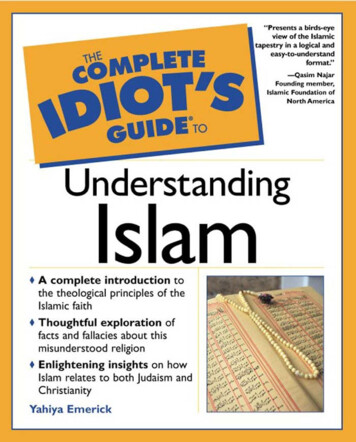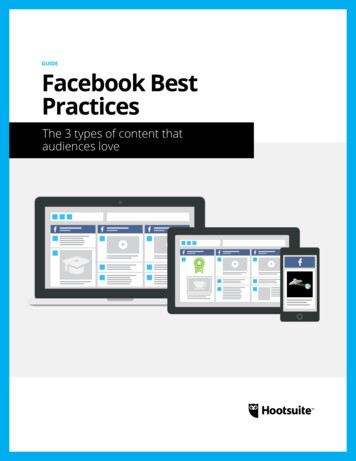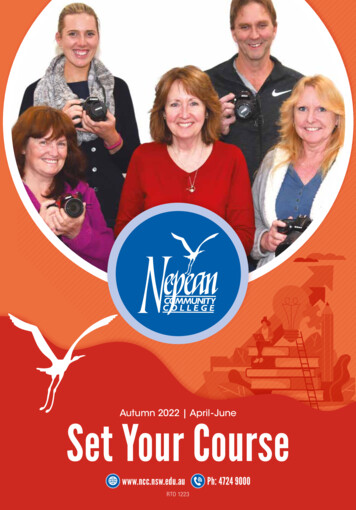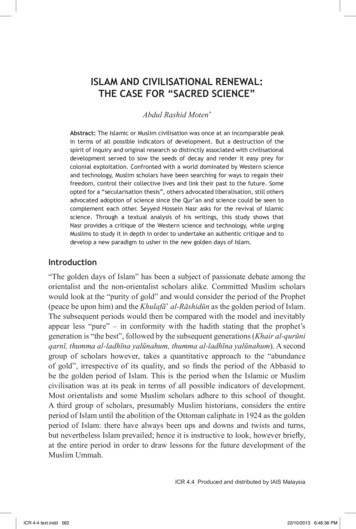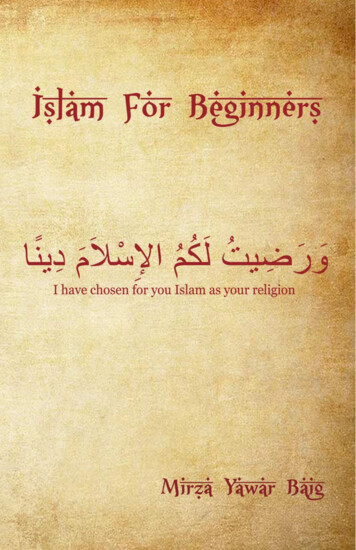
Transcription
1
DedicationI dedicate this book to all those, friends and strangers, whoasked me about Islam. I dedicate this book to all those whoare genuinely in search of the truth, with the dua thatAllah may make their search easy and fruitfulculminating in them recognizing their Creator, who one daythey will meet.1
Why this bookIt has been said that true bankruptcy is a full belly and anempty soul. Religion must be a matter of conscious choice.Not a matter of accidental birth. Because on it depends ourpeace of mind, how we view the world, our relationshipswith others, what choices we make and the results of thosechoices in this life and the Hereafter. What we choose tobelieve or reject must be done thoughtfully after duereflection and investigation because our present and oureverlasting future both depend on it. It can’t be left toincidental following of traditions and customs we don’teven know the origin or meanings of, just because ourparents or elders used to do them.One’s spiritual journey is as important if not more, as one’sjourney in this life in terms of one’s career or other criteriaand so deserves an equal mindshare and effort.It has long been on my mind to write a small, easy tounderstand book about Islam for the average non-Muslimwho has questions about Islam and Muslims, many ofwhich may be as a result of the prejudiced representationwhich has become the fashion in the media and elsewheretoday. I believe it is therefore necessary to state the facts asthey stand and leave it to the reader to draw their ownconclusions.It is not my purpose in this book to convince you one wayor the other. Simply to present facts about Islam so that thereality of what Islam is and stands for is before you. The restis up to you.2
I believe that the single biggest source of conflict is badinformation. Wrong information about someone or theirculture, beliefs and ways which leads us to makingassumptions about them that develop into stereotypes. Thedifficult part is that for most people it is not easy to get goodinformation, firstly because they don’t know who to ask andsecondly because in the case of some technical or legalmatters it is necessary to first have some basic knowledgeand understanding of sources, derivative principles andinterpretations to understand a particular ruling. Just as onewouldn’t be able to understand a medical diagnosis withoutsome basic knowledge of medicine, so also one can’tunderstand a legal ruling (whether it be secular law work being used.On the other hand the media in its single minded pursuit ofprofit irrespective of means or methods uses Islam onalizing everything possible instead of taking areasoned and rational approach. The result is that theaverage viewer/reader is left at best bewildered and da masquerading as fact. ‘News’ today is closer toadvertising copy than to the accurate reporting of events.It is in this context that I decided to write this book.Over the years many people, friends and strangers, Muslimand non-Muslim, have asked me questions about Islam.In answering them I tried to do two things:3
1. Give evidence for my answers and explanations fromthe two foundational sources of Islam, the Qur’an andthe Sunnah (Hadith)2. Try to explain in the common person’s language givingexamples which are modern and easy to understand.This seems to have worked well and on the suggestion ofsome of the questioners who found the answers they werelooking for, I have tried to put together as many answers asI can in this book. The arrangement of the questions andanswers is not sequential and so you can open the book atany point and read. It is not necessary to read it frombeginning to end, though I hope you will do so.It is my purpose to give you accurate information aboutIslam to the best of my ability without trying to color yourjudgment or to convince you one way or the other. Whatconclusions you come to and what decisions you take afterreading this, is entirely up to you. I only hope that whateveryou decide will be based on good information and not onpropaganda.It is also my intention to encourage people to conduct theirown independent research into Islam, its tenets, culture,rules and regulations, permissions and prohibitions, itsworld view and its understanding of God (Allah ).And very importantly into the life of its central, single mostimportant figure, the Prophet and Messenger Muhammad .I hope you will take the time and trouble to distinguishbetween what Islam ordains and what Muslims in differentparts of the world do as a result of their own local cultures4
and superstitions, whims and fancies, customs and practice.I wish I could say that all Muslims practice Islam in the pureform that Muhammad brought. Unfortunately they don’tand the results are sadly visible. That is the reason it isessential to distinguish and differentiate between what isIslam and what is local tradition, culture or superstition. Ihope that as a result of reading what is in this book, yourinterest will be piqued to read more and delve deeper intowhat Islam really is.I wish you all the best in your quest for knowledge and praythat you are guided to the truth because in the end it isessential that we know what the truth is and that we believeit and prepare for it. It is the nature of reality that it does notdepend on belief for its existence and that one day it has tobe faced whether we chose to believe in it or not.M. Yawar Baig5
Table of ContentsWhat do Muslims believe? . 9What are the pillars of Islam? . 25What is permitted and what is prohibited in foods,business and entertainment? . 54What do we wear? . 58How do we live with others? . 60How do we deal with money? . 68Common questions asked about Islam . 756
Glossary of TermsRasoolullah Muhammad, Messenger of AllahThe Arabic script after the English means:Peace & Blessings be on himAllah The personal name of God.The Arabic script after the English means‘The GloriousRabbLord, Sustainer, Protector, Provider for allneeds: One of the names of Allah AakhiraHereafterGhaibUnperceivable (wrongly called Unseen)JannahParadiseJahannamHell fireRibâBank Interest and other similar gainsShari’ahIslamic LawSunnahTeachings of Muhammad which is thesecond source for Islamic LawFajrDawn prayerDhuhrMid-day prayerAsrAfternoon prayerMaghribSunset prayerIshaNight prayer7
TahajjudPrayer in the last part of the night, beforedawnDhikrRemembering Allah in any wayDuaSupplication, personal prayer asking forwhatever one wants to ask Allah JibreelAngel GabrielWahiRevelation: the Qur’anAli bin AbiCousin of Muhammad who the Shia askTalibfor help instead of asking Allah Abdul QadirA scholar from Baghdad who manyJeelaniSunnis ask for help instead of askingAllah ShirkPolytheism; joining partners with Allah in his being, work, actions, attributes orpower. Or ascribing divinity to anyone oranything other than Allah KufrDenial of Allah including denying Hisattributes, commands, words (Qur’an) orHis being (atheism)8
What do Muslims believe?9
We believe in Allah We believe that Allah is One, alone, without olders;incomparable to and unlike anything in His creation.We believe that Allah needs nobody and nothing and thateverybody and everything needs Him. We believe thateverything and everyone will exist as long as Allah wishes and ends or dies when He decrees.We believe that Allah provides for and sustains everyoneand everything and needs nothing from anyone oranything.We believe that all that exists was created by Allah as Hewished, in the form and nature He wished, at the time andplace that He wished, without anyone else’s help or supportand that He will cause it to end when He wishes withoutanyone else’s help or support.We believe that Allah created all that we know and allthat we are not yet aware of without getting tired in theleast and without needing any rest.We believe that Allah does not have and is not limited byour natures and attributes and so our own limitations ofstrength, intelligence, power, influence, knowledge orenergy or anything else don’t apply to Him.We believe that Allah has His own unique attributes andqualities some of which He told us about.10
We believe that though words similar to those we use maybe utilized to describe the attributes of Allah i.e. sight,hearing, mercy, forgiveness, hand, face and so on – none ofthese can be compared to our attributes. We believe He hasthese attributes because He mentioned them withoutwondering about or trying to conceptualize their exactnature. We do this because we believe that the attributes ofAllah , by definition are beyond the comprehension ofhuman intelligence, except that which Allah chose toexplain to us.Therefore we believe that Allah alone is worthy ofworship and worthy of asking for help and so He alone weworship without associating anyone or anything with Himin any way whatever and He alone we ask for help.We don’t worship anyone other than Allah , no matterhow holy, powerful or wise that individual may have been.So we don’t worship Jesus, Moses or Muhammad or anyother prophet. We don’t worship any celestial object like thesun or moon or any star or planet or constellation. We don’tworship any animal, bird, mountain, river or ocean.We don’t worship anything in creation. All such beliefs arefalse, not part of Islam and amount to (Shirk) polytheism.We worship only Allah , the Creator of them all.We also don’t ask the help of anyone other than Allah nordo we join anyone with Allah when we ask for His help.So we don’t ask the help of Jesus, Muhammad , Ali bin AbiTalib, Abdul Qadir Jeelani, any saint, any holy man or11
woman, any angel, jinn or creature of any kind. All suchbeliefs are false, not part of Islam and amount to (Shirk)polytheism and place a person outside Islam.We ask the help only of Allah , the Creator of them all.We also don’t ascribe the qualities of Allah to anyone oranything in His creation because He mentioned that nothingin creation resembles Him in any respect. So we don’tbelieve that any human being has or had any divine qualityand we don’t ascribe any human or other creature quality toAllah . We don’t believe in and refute and deny beliefsthatascribequalities ofknowledgeof the future,omnipresence and omniscience, ability to influence theuniverse or people’s lives, interfere in the order and processof the universe and all such things to people; like Jesus,Muhammad , Ali bin Abi Talib, the Imams of the Shia,Abdul Qadir Jeelani or any other human being, angel, jinnor other creature.All such beliefs are false, not part of Islam and amount to(Shirk) polytheism and place a person outside Islam.We believe that Allah is unlike anything in His creationand is not bound by any of the rules of creation. He makesthe rules of creation and as the Rule Maker, He can changeany rule He wants, whenever He wants.This is the core, fundamental theological principle in Islam,called Tawheed – unity of worship of Allah alone.Any mixture or adulteration of belief by associating anyonewith Allah either in His worship or by asking the help of12
anyone else along with or instead of Allah or of ascribingdivinity or divine qualities to anyone other than Allah towhom alone all divinity and divine qualities belong; rendersthe individual out of Islam. Similarly denying Allah , Hisattributes, His Book, His promises, His laws, the meetingwith Him, His Messenger or his teachings also render aperson out of Islam.A Muslim is conscious of Allah all the time. For examplewhen he meets someone he says, ‘As salaamu alaikum’(May peace be on you) which is a dua. When he partscompany he says, ‘Fee Aman-illah’ (may you be in theprotection of Allah ). When he starts anything, be it ajourney or a meal, he says, ‘Bismillah’ (in the name ofAllah ). When he ends he says, ‘Ahamdulillah’ (all praiseand thanks are for Allah ). He says this also whenever hereceives anything good. If he gets any bad news or suffersloss he says, ‘Inna lillahi wa inna ilaihi rajioon’ (we are fromAllah and to Him is our return). When he faces anydifficulty he says, ‘HasbiAllah’ (Allah is sufficient for me).When he promises to do something he says, ‘Insha’Allah’ (IfAllah wills).If he sees anything good he says,Subhan’Allah’ (Glorious is Allah ) and if he sees or doesanything bad he says, ‘Astaghfirullah’ (I ask the forgivenessof Allah ). If he is led astray he says, ‘Aaoodhubillah’ (Iseek the protection of Allah ). When he is surprised by themagnitude of something he says, ‘Allahu Akbar’ (Allah isthe greatest).Then there are the daily duas (supplications, prayers) thatevery Muslim child is taught. These are short supplications13
for goodness, health, protection from evil, asking for easeand increase in sustenance, thankfulness for all the blessingsthat we have been given. Supplications at the beginning of ajourney, while entering the house and while leaving it;before starting a meal and upon ending it; before sleepingand upon waking up; before entering the toilet and whenleaving it; when wearing new clothes; when visiting tulating someone. The Muslim does all this and moreapart from his formal worship (Salah or Namaz) as a matterof course in his daily life.This is not an exhaustive list but it demonstrates how thedaily language of the Muslim is sprinkled with theremembrance of Allah so that he is conscious of HisPower and Majesty all the time, in every situation.It would perhaps not be out of place to say that no otherpeople mention God so often and in so many parts of theirlives, as do the Muslims. Allah is very important toMuslims.Do’sDon’tsWorship, ask for help andDon’t worship, don’t ask forascribe divine attributes onlyhelpto Allah .divine attributes to anyoneotherandthandon’tascribeAllah ,matter who that may be.14no
We believe in the MessengersWe believe that Muhammad like all the prophets andmessengers before him was a human being; was not divineand was a messenger of Allah . We believe in addition thathe was the last and final messenger of Allah and thatthere is no prophet or messenger after him. We believe inhim and in the message that he brought which is calledIslam. Believing in Muhammad as the last and finalmessenger is part of the foundational belief and creed ofIslam. We refute and deny anyone who claims Prophethoodafter Muhammad . We reject the claim to Prophethood ofMirza Ghulam Ahmad Qadiyani (followers called Mirzayi,Ahmedi or Qadiyani) or anyone else who came afterMuhammad and claimed to be a prophet or messenger ofAllah . We consider all such people to be liars and theirclaims to be false.We believe that every messenger of Allah brought thesame message of Islam and that they were all Muslims –people who submit themselves to Allah - and that theyalso invited their people to submit to Allah .We believe that none of them told their people to worshipthem instead of Allah and so we deny all such beliefswhich claim divinity for the messengers of Allah ; likeJesus, his mother Mary or anyone else. We believe thatneither Mary nor Jesus told people that they were divine.Nor did Jesus claim to be the son of Allah , nor did Marycall herself, ‘Mother of God’, nor did either of them tell thepeople to ask for their help instead of asking for the help ofAllah . Those who claim such things are guilty of15
fabricating lies about Jesus and Mary and of slander againstJesus and Mary. To accuse a messenger of changing themessage is slander and that is what the claims of divinityfor Jesus and Mary amount to. Muslims deny all suchclaims. We believe that Jesus was a messenger of Allah , Jacob, Joseph, David, Solomon and Moses andlike the last messenger who came after him, Muhammad .We believe that Jesus preached nothing other than what hehad been sent with and that he performed his duty as amessenger of Allah with complete integrity and honesty.We believe that those who claim that he was son-of-god aremaking a grave allegation against him and will answer toAllah on the Day of Judgment when Jesus himself willrefute and deny them.We believe in all the Messengers of Allah that Hementioned and we believe that He sent messengers to allpeople in all times. However we don’t believe about anyonethat he was a messenger of Allah unless he is one of thosementioned by Allah . We follow only the message of thelast of them, Muhammad because his message supportsthe truth of all messages that came before it in terms ofmonotheism and the worship of Allah alone andsupercedes and overrides every other message that camebefore it in terms of the Law. In the words of Muhammad ,‘If Moses were alive today, he would follow the Law that Ihave brought.’16
Do’sDon’tsBelieve in Muhammad asNotthe Prophet and MessengerMuhammad of Allah and His slave andthan human. Not believecreature.that anyone else was abelievethatwas otherprophet or messenger ofAllah after Muhammad 17
We believe in the Books of Allah We believe that this last message consists of the Qur’an –the Book of Revelation – which is the direct speech ofAllah and is the primary source of Islamic law and theteachings of Muhammad which are an explanation of theQur’an in terms of its application and practice in daily life.The latter is known as the Sunnah and is also revelation butof a different kind. The Qur’an is recited in worship and is apart of worship. The Sunnah is studied and applied in lifeand shows us how to worship; among many other things.However it is not recited in worship as is the Qur’an.We follow the Qur’an in every word that it contains andaccept all its injunctions without hesitation, change,alteration or reservation. We accept all the divine laws itcontains without reservation and believe that this DivineLaw is the only law that has a right to be implemented onearth. We believe that whoever tries to alter anything of theQur’an, be it a single letter of it; anyone who deniesanything of the Qur’an, be it a single letter of it; anyone whorejects anything of the Qur’an, be it a single letter of it;anyone who makes fun of or doesn’t believe in any of thepromises, descriptions and narrations of the matters of theUnperceivable and the Hereafter, has left Islam.We believe that it is essential for the Muslim to believe in,understand and implement the Qur’an and Sunnah inhis/her life because this is the best possible way to live.18
We believe in all the other Divine Books that Allah mentioned in the Qur’an i.e. Torah, Zaboor and Injeel – thatthey were Divine Revelation in their original form. We don’taccept the changes that have been made to them and don’taccept them as a source of Islamic Law. We believe that thepeople who made the changes had no right to do so andthat they exceeded their authority. To make changes in aDivine Revelation is comparable to making changes in thewriting of an author without his permission. We call that‘copyright violation’ and it is a cognizable offence. Howthen can we accept changes in Divine Revelation withoutthe permission of its author, Allah ? That is why noMuslim will ever agree to any change in the Qur’an becauseshe/he understands his own position with respect toAllah .We believe that it is essential to understand and implementthe Sunnah (teaching, way) of Muhammad in our livesbecause the Sunnah explains the Qur’an. As mentionedabove, we believe the Sunnah to be another form ofRevelation which is called Wahi Ghayr Matlo’o (revelationthat is not recited in prayer). We believe that this revelationwas sent to explain the Qur’an and so is an essential part ofIslamic theology and the second most important source ofIslamic Law. We believe that anyone who denies theSunnah partially or in totality and claims that the Qur’an issufficient for him, proclaims his own gross ignorance andhas left Islam. Even a cursory study of the Qur’an will makeit clear to the sincere person that the explanation of the Lawis essential to understand and implement the law.19
So is the case with the Qur’an and the Sunnah. The Sunnahcomplements the Qur’an and is essential for one to be ableto understand the method of carrying out Qur’anicinjunctions and laws. Without the Sunnah it is impossible toimplement the Qur’an and therefore those who reject theSunnah are also rejecting the Qur’an.Just to give one example, the Qur’an orders the Believer toestablish the prayer (Salah) but is silent on the method ofprayer. It orders the Believer to pay Zakat (obligatorycharity) but is silent on what it is to be paid on and its value.Both of these and numerous such matters were explained byMuhammad by means of the revelation he received aboutthese details which we know as the Sunnah.So one who does not accept the Sunnah can’t pray and can’tpay Zakat which automatically renders him out of Islam.Finally the Qur’an orders the Believer in more than oneplace to follow the way of Muhammad (Sunnah) and soanyone who refuses to accept the Sunnah has denied theorder of the Qur’an which places him out of Islam.20
Do’sDon’tsAccept the Qur’an as theDon’t criticize, make fun of,finalexpress opinions on andrevelation,readit,understand it and implementgenerallyspeaklooselyit in your life. Accept theabout the Qur’an or theSunnah of Muhammad andSunnah.follow it to the best of yourability.Always have and express theDon’t sit with people whohighestmake fun of the Qur’an orrespectfortheQur’an and Sunnah whichSunnahthe Revelation of the Wordthem as your friends.of Allah and the beautifulteachings of His Messenger deserve.21anddon’thave
We believe in the Angels, Day of Judgment and DestinyWe believe in the angels of Allah , in general that they arecreatures of Allah which He created to carry out Hisorders and for other purposes as He wishes. We believespecifically in those He named, i.e. Jibreel (Gabriel),Mika’eel, Israfeel, Maalik (angel in charge of Jahannam),Ridhwaan (angel in charge of Jannah) and Malak-ul-Mawth(Angel of Death).We believe in Jannah (Paradise) and Jahannam (Hell) and inall the details of both that Allah mentioned in the Qur’anand that His Messenger mentioned in his teachings(Sunnah).We believe in the Yawn ul Aakhira, also called Yawm ulQiyaama (Day of Judgment), Al Meezaan (the Scale onwhich the deeds of people will be weighed), Al Qalam (thePen), Al Lawh ul Mahfooz (the Sacred, Protected Tablet), AlArsh (the Throne of Allah ) and Al Kursi (the Footstool),As-Siraat (the bridge over Jahannam – Hell), the Hawdh ulKauthar (the pool of Muhammad ) and all other suchmattersofAl-Ghaib(Unperceivable)whichAllah mentioned in the Qur’an or which His Messenger told usabout. We believe in all of them without asking ‘How’ –without asking about their specific nature and quality. Webelieve that they are as Allah and His Messenger described them and that it is not necessary or possible forthe human being to know more or to try to encompass ofthe knowledge of Allah more than He wishes.22
So we believe in all these things absolutely and withoutdoubt to the extent that we have been informed and don’textend our own explanations or interpretations about whathas been described. Nor do we deny anything of what hasbeen described. It is this obedience that is the hallmark ofthe Muslim and we exhibit this obedience.We believe in destiny; that Allah has decreed for usmatters which are not in our control e.g. our death, illness,health, our sustenance (including material wealth). Webelieve that whatever Allah has decreed will come to passand that we have no control over it. We believe also thatthere are things about our lives that Allah has given intoour control e.g. the sources of our earning and spending,how we live, what we eat, how we treat people, whether ornot we fulfill the rights of Allah and of people and so on;about which we will be questioned and rewarded orpunished as the case may deserve.Our (the Islamic) belief in destiny is not that it is absolute inall respects and that we are compelled by it but that it givesus limited freedom. For example the quantity of oursustenance (Rizq) is fixed but we have the liberty to take itusing permitted or prohibited means. Each choice has itsown consequences. We are free to choose but the choice isnot free. Every choice has a consequence in this world and areward or punishment in the Hereafter associated with it.The means don’t affect the quantity but they will affect whathappens to us on the Day of Judgment. In order to save usfrom the evil consequences of our own deeds, Allah sentHis Messenger and His Revelation (Qur’an) to teach us the23
right ways. If someone chooses to ignore them and insistson doing whatever he wills without a thought about theconsequences of his actions then he will have only himselfto blame.24
What are the pillars of Islam?25
The Pillars of Islam are five:Shahadatain (Twin Testimonies)To bear witness that there is nobody worthy of worshipexcept Allah ; to believe this in the heart and to actaccording to this in all aspects of life (not to worship anyoneother than Allah or ask for help from anyone other thanAllah and not to join anyone with Allah in anythingrelating to Him); and to bear witness that Muhammad isthe messenger of Allah and is His last and finalmessenger.These two aspects of bearing witness are essential for one toenter Islam. If one does this i.e. believes the above and saysit out aloud if they can (even if he/she does it on their own),then they are Muslim and have entered Islam.Normally it is customary to accept Islam in the presence ofwitnesses as that is more supportive and you get theblessings of others. But it is not a requirement for enteringIslam. Allah is enough as a witness and so if one wants toenter Islam there is nothing that needs to delay that actionespecially since dying without Islam leads to the Hellfire.Since Islam is the original religion of all people and allpeople are born on Islam, when someone enters Islam wedon’t call them ‘convert’ but we call them ‘revert’ becausethey have in effect reverted to their own original state.26
SalahSalah is the name for the formal prayer in Islam whichMuslims perform five times daily. Fajr is performed atdawn, Dhuhr is a noon prayer, Asr is performed in theafternoon, Maghrib is the sunset prayer, and Isha is thenight prayer.Salah is a pillar of Islam and something which indicates thata person is Muslim. Salah is the proof that one has enteredIslam. It is the physical manifestation by action of the faiththat a Muslim has in his heart that he worships nobodyexcept Allah . Once he has that faith, he demonstrates it byactually worshipping Allah in the way that Allah prescribed and taught His Messenger . If one says thatnobody is worthy of worship except Allah (La ilaaha illAllah) but then does not actually worship Allah , thenhow can he say that he has faith? That is why leaving Salahnegates Islam and places a person outside Islam.Salah is a gift from Allah and is the means for the Muslimto connect to his Rabb (Creator, Sustainer, Maintainer,Protector, fulfiller of all needs). It is the highest and mostpowerful of means; the most potent tool that a Believer hasto invoke for anything that he needs in life. It is his ‘charge’of energy which gives him a special light and power allthrough his days in this life and is a light in his grave anddeliverance in Al-Aakhira. More about the Salah laterbecause it is such an important part of this Deen.27
Sawm (fasting)Fasting is an obligatory act during the month of Ramadan.Muslims must abstain from food, drink, and sexualintercourse from dawn to dusk during this month, and beespecially mindful of other sins. Fasting is obligatory forevery Muslim over the age of puberty.The fast is meant to allow Muslims to seek nearness toAllah , to express their gratitude to and dependence onHim, atone for their past sins, and to remind them of theHereafter. Fasting is meant for us to reflect on our lives,straighten our actions and bring them in line with thecommands of Allah . Fasting reinforces obedience toAllah in all things without exception; that we obey Himwhether or not the command is likable, logical or not.Fasting in Ramadan is like an annual retreat and intensivetraining program in obedience to Allah . It is anopportunity to repent our sins and transform our lives.Fasting during Ramadan is obligatory, but for severalgroups for whom it would be inadvisable for health reasonsor excessively problematic; e.g. young children, diabetics,elderly people, and pregnant or nursing mothers, it isacceptable not to fast and they can make up their missedfasts or pay for someone else’s food. The specific details ofwhat is to be done in each case must be ascertaineddepending on specific circumstances. Fasting is a means ofgaining Allah ’s pleasure and so is something that everyMuslim looks forward to doing.28
Ramadan is awaited and Muslims rejoice when it comesbecause it brings with it special rewards and blessings.ZakatZakat is charity which is obligatory for anyone who is ableto give it – based on a specific amount of wealth that onehas accumulated for 12 months. Zakat is a personalresponsibility of every Muslim who has the minimumamount of wealth that makes him liable to pay Zakat. Zakatis the purification of wealth just as prayer is purification ofthe body and heart. Islam makes charity not only an act ofgoodness but an act which is compuls
The Arabic script after the English means: Peace & Blessings be on him Allah Rabb The personal name of God. The Arabic script after the English means 'The Glorious Lord, Sustainer, Protector, Provider for all needs: One of the names of Allah Aakhira Ghaib Hereafter Unperceivable (wrongly called Unseen) Jannah Paradise

